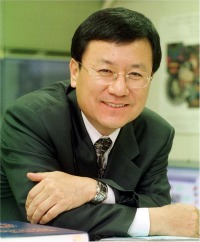
Sung-Chul Shin, chair-professor of the Department of Physics at KAIST, has been elected to become the 24th president of the Korean Physical Society (KPS). Professor Shin is to take up the position on January 1, 2011 and will hold this position for two years. The Korean Physical Society, widely recognized as one of the best national scientific organizations, was established in 1952 and currently has over 14,000 members. His appointment as KPS president is yet another mark of recognition for Professor Shin, who has garnered international renown for his work in the field of Magnetic Materials Physics and is also a fellow of the American Physical Society. He also previously held the vice-president post at KAIST for a brief period.
Professor Shin holds a bachelor’s degree in Applied Physics from Seoul National University, after the completion of which he attended KAIST to receive his M.S. in Condensed Matter Physics in 1977 before completing his doctorate in Materials Physics at Northwestern University in 1984. He has vast experience in his field, having worked at various laboratories such as the Eastman Kodak Research Lab and Korea Research Institute of Standards and Science as a senior research scientist and senior researcher, respectively. Professor Shin joined KAIST in 1989 as an assistant professor, after which time he has also taken up other positions alongside his professorship, becoming the director of the Center for Nanospinics of Spintronic Materials, a research facility supported by the Creative Research Initiatives program of the Korean Ministry of Science and Technology.
Professor Shin’s research interests include Artificial Sytheses and Characterizations of Nanomagnetic Materials, Magnetic Anisotropy and Magneto-Optical Phenomena, and Spin-Dependent Electron Transport Phenomena. His research works at the Center for Nanospinics of Spintronic Materials aims to “establish nanomagnetism as well as… develop novel spintronic materials through studying the domain configurations and spin dynamics in nanomagnetic materials.” In order to accomplish these objectives, Professor Shin’s lab focuses on the development of both nanomagnetic materials, including nano-scale thin-films and molecular magnets, and ultrasensitive measurement techniques.

